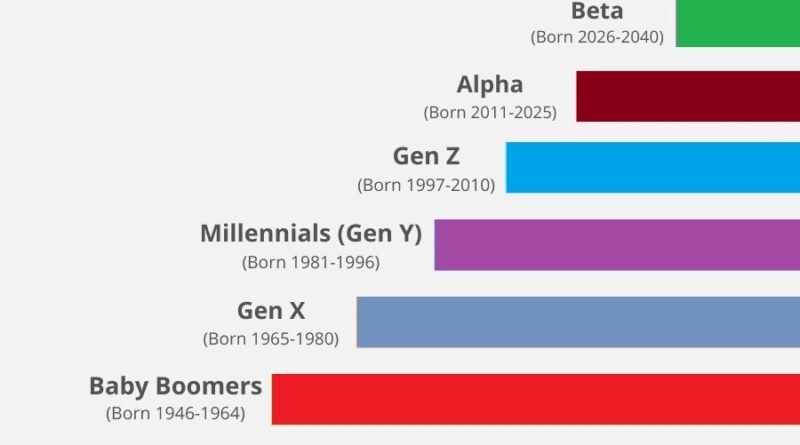Exploring Generation Y (Millennials) and Generation Z
Introduction
Generations Y (Millennials) and Z are often discussed in tandem due to their proximity in age and shared exposure to rapid technological advancements. However, these two cohorts exhibit distinct characteristics shaped by their unique formative experiences. From their approach to technology and work to their social values and spending habits, understanding Millennials and Gen Z provides insights into the evolving dynamics of society and the future.
Generation Y: The Millennials (1981–1996)
Defining Characteristics
- Tech-Savvy Pioneers
Millennials were the first generation to come of age with the internet, email, and personal computers. Many remember the transition from dial-up modems to broadband and the introduction of social media platforms like Facebook, MySpace, and Twitter. This early adoption of technology has made them adaptable and open to learning new tools. - Education-Focused
Millennials placed a high value on education, with many pursuing college degrees in response to societal expectations. However, this focus on higher education also led to significant student loan debt, which has shaped their economic and lifestyle choices. - Experience Over Possessions
Unlike previous generations, Millennials prioritize experiences—such as travel, dining, and events—over acquiring material possessions. This trend has driven the rise of the experience economy. - Work-Life Balance Advocates
Millennials redefined workplace culture, emphasizing flexibility, meaningful work, and collaboration. They seek jobs that align with their values and often prioritize mental health and well-being over traditional corporate loyalty. - Social Responsibility
Millennials are known for their strong stance on social and environmental issues. They have driven movements for sustainability, diversity, and corporate accountability, expecting the same values from brands they support.
Challenges Faced by Millennials
- Economic Hardships
Millennials entered the workforce during the Great Recession (2008–2009), which led to unemployment, underemployment, and stagnant wages. Many delayed traditional milestones such as homeownership and starting families due to financial instability. - Student Debt Crisis
With rising tuition costs, Millennials became burdened with unprecedented levels of student debt, affecting their purchasing power and ability to save for the future. - Digital Burnout
As early adopters of smartphones and social media, Millennials have faced the downside of constant connectivity, including stress, burnout, and mental health challenges.
Generation Z: The Digital Natives (1997–2012)
Defining Characteristics
- True Digital Natives
Unlike Millennials, who witnessed the evolution of technology, Gen Z has never known a world without smartphones, social media, or instant access to information. They navigate digital platforms with ease, making them highly resourceful and informed. - Socially Conscious and Pragmatic
Gen Z is deeply concerned about global issues like climate change, racial justice, and economic inequality. While they share Millennials’ passion for social causes, Gen Z approaches these challenges with a more pragmatic and action-oriented mindset. - Entrepreneurial Spirit
Growing up in the gig economy and witnessing the rise of influencers and digital entrepreneurs, Gen Z is highly entrepreneurial. Many aspire to start their own businesses or monetize their skills through platforms like YouTube, TikTok, or Etsy. - Short Attention Spans
With the abundance of content available at their fingertips, Gen Z is known for having shorter attention spans. They favor quick, visual, and interactive formats, such as TikTok videos and Instagram Reels, over lengthy articles or traditional advertising. - Mental Health Awareness
Gen Z places a strong emphasis on mental health and emotional well-being. Unlike previous generations, they are more open about seeking therapy, discussing mental health issues, and advocating for systemic changes in education and the workplace.
Challenges Faced by Gen Z
- Economic and Job Market Uncertainty
Gen Z entered the workforce during the COVID-19 pandemic, which disrupted industries and created job market volatility. Many face financial insecurity and rising living costs. - Screen Dependency
While their digital proficiency is an asset, excessive screen time has led to concerns about social isolation, reduced physical activity, and mental health issues among Gen Z. - Global Instability
Growing up in an era of climate change, political polarization, and rapid societal shifts, Gen Z faces heightened anxiety about the future, often labeled as a “crisis generation.”
Key Differences Between Millennials and Gen Z
| Aspect | Millennials (Gen Y) | Gen Z |
|---|---|---|
| Technology | Grew up during the internet’s rise | Born into a world of smartphones |
| Social Media | Early adopters of platforms like Facebook | Favor visual platforms like TikTok |
| Values | Emphasize experiences and self-expression | Focus on authenticity and social impact |
| Work Ethic | Value work-life balance and collaboration | Prefer independent, entrepreneurial paths |
| Consumer Behavior | Brand loyalty with a preference for ethics | Value affordability and sustainability |
The Shared Legacy of Gen Y and Gen Z
Despite their differences, Millennials and Gen Z share common values, including a commitment to social justice, diversity, and leveraging technology for good. Together, these generations are reshaping industries, redefining workplace norms, and pushing for systemic change in areas like climate action and equality.
As we move further into the 21st century, the collaboration and innovation between Millennials and Gen Z will likely be pivotal in addressing global challenges and creating a more inclusive, sustainable world.
Conclusion
Generation Y and Generation Z, while distinct, are united by their adaptability and resilience in the face of rapid change. Their influence on culture, technology, and social values continues to grow, paving the way for future generations. By understanding their strengths and challenges, society can harness their potential to build a better future.

